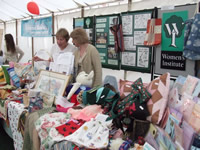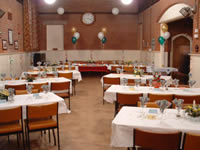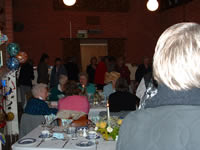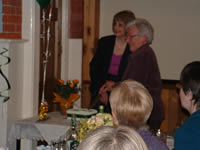Welcome to the Calverhall Womens Institute

Welcome to the Calverhall Womens Institute

Come and make new friends, learn new skills, enjoy garden visits, theatre/concert trips, walks, competitions…..and more. We meet on the 2 nd Thursday of each month at 7.15.p.m. in Calverhall Village Hall. Guest Speakers ****** Raffle ******* Refreshments. Why not come along and see what we do? Bring a friend (or two). We promise a warm welcome to all (more Calendar Girls than Jam and Jerusalem).
Photos (click thumbnail for full size image)
 |
 |
 |
 |
 |
23,322 SIGN WI PETITION TO END VIOLENCE AGAINST WOMEN
Fay Mansell, chair of the National Federation of Women’s Institutes’ (NFWI), will today (18 February) deliver a petition signed by 23,322 WI members to 10 Downing Street calling on the government to eliminate violence against women and girls in the UK. Professor Liz Kelly, chair of the End Violence Against Women (EVAW) coalition will join Fay in handing over the petition that urges the prime minister to take steps to eliminate violence against women and stand by the UK’s commitment to ensure women and girls their basic human right to live free from violence.ALMOST HALF OF WI MEMBERS AFFECTED BY VIOLENCE
Almost half of WI members recently surveyed have experienced violence themselves or know someone who has experienced a form of violence in their lifetime according to research published today by the National Federation of Women’s Institutes (NFWI). A third of these cases were domestic violence and almost a quarter was rape or sexual assault.The survey of WI members found that they feel there is a significant lack of support services for women experiencing violence, with almost a quarter saying that women in rural areas were particularly affected. Fay Mansell Chair of NFWI said: “WI members come from all walks of life. This survey shows that violence can affect any woman and is not just confined to women in poverty or on the fringes of society. For too long, women have been suffering in silence, afraid or ashamed to seek help. We need to show them that they are not alone.”The findings come as the WI holds a conference in London today (25 November) to raise awareness of violence against women and launch a new research project with Bristol University into violence against women in rural areas. Women living in rural and urban areas across England and Wales are invited to take part in the new research by visiting www.theWI.org.uk/campaigns.Harriet Harman MP, Minister for Women and Equality, will address the conference and WI members will hear about how violence affects women globally.The Minister will say that there are signs of serious progress, with the number of domestic violence incidents more than halving since 1997 and a significant increase in the number of convictions, but that there is still much more to be done.
Ms Harman is expected to say: "Fewer crimes and more convictions is the trend we want to see continue. But we have to continue to challenge reactionary attitudes – that domestic violence is a private matter between husband and wife and we shouldn't intervene, or that she has bought it on herself. Whatever happens in a relationship, domestic violence should never be excused."The NFWI is part of the End Violence Against Women Coalition, which is calling for the UK government to develop and implement an integrated strategy on violence against women based on the foundations of gender equality and human rights.
LOVE FOOD PROJECT
Women get together to cut food waste by half. A pilot initiative between Love Food Hate Waste and the National Federation of Women’s Institutes has helped homes to cut the food they throw away by half, and make big savings on their food bills.
The partnership organisations set up the Love Food Champions project to enable groups across the country to exchange advice and ideas on making the most of their food, and to see if they could waste less. WI members volunteered to be ‘Champions’, recruiting and then running groups for local non-WI residents in their own communities.
Before the project the group participants were throwing away 4.7kg of food per week – just slightly less than the National average - but after the project, they were wasting less than half this amount per household. The groups not only managed to cut back on the food they were throwing out, but also learned new skills on food management and cooking. Another very positive outcome to the pilots was its social side: some participants still meet up with each other.
Cambridge primary school teacher, Milly Descrivan claims she has saved £200 a month on her food bill as a result of Love Food Champions. She said: “The project has helped my family eat healthier - we even have ‘leftover day’ at home now where I won’t cook anything new, we just use leftovers.”
“In the Easter Holidays, as an experiment, I went to my local supermarket to buy exactly what I needed when I needed it. My shopping bill was halved and food wastage practically non-existent.”
The Love Food Champions Report is being published today by Love Food Hate Waste, the campaign set up by WRAP (Waste & Resources Action Programme) almost 12 months ago, to tackle the huge problem of food being wasted in UK homes. The pilot project ran over 4 months from February this year, with groups completing the project in 10 areas around England*. Topics covered planning and shopping for meals, keeping food fresh for longer, and enjoying leftovers. A WI workbook accompanied the project, which is also available online at www.lovefoodhatewaste.com
Julia Falcon from the Campaign said “We throw away a third of the food we buy in the UK, so to cut back that waste by 50% is outstanding. Although this is just a pilot, we can see that groups, who decide to share their experiences with each other, and tackle this problem together, can work extremely well”. She continues “We’d like others to try something similar in their own home town, and so we are producing a “step-by-step” guide which should help other groups wishing to follow suit.” The project shows so much promise that several local authorities are hoping to start schemes in the near future.
“Reducing food waste is a win-win situation for consumers. You can reduce your food bills and help the planet by sending less waste to landfill. We have shown that you can reduce your food waste by half. Imagine the impact we can make if everyone reduces their food waste by half” said Fay Mansell, chair of the National Federation of Women's Institutes.
Environment Secretary Hilary Benn, said:
“Food belongs on our plates and not in the bin. This initiative shows that with a bit of ingenuity and a willingness to share ideas, food waste can be cut to an absolute minimum – putting money back in people’s pockets and diverting damaging food waste from landfill. I would like to congratulate the Women’s Institute and WRAP on this initiative." Research from Love Food Hate Waste* shows that most people don’t think they waste food, but by the end of the project almost 100 % of participants said that it bothered them a great deal or a fair amount to throw uneaten food items away.
For a copy of the Love Food Champions report and tips about how to reduce food waste, please visit www.lovefoodhatewaste.com or www.thewi.org.uk/campaigns
The Food We Waste report, released in May 2008 by WRAP, showed that in the UK we buy and then throw away £10bn worth of food which could have been eaten.
ONE RESOLUTION PASSED
Imagine a world with less methane gas (a potent greenhouse gas with a high global warming potential) and fewer landfill sites. You can help create one simply and easily by – composting! And what better time to start than during Compost Awareness Week in May, which the National Federation of Women’s Institutes (NFWI) is delighted to support. Delegates at the National Federation of Women’s Institutes (the NFWI) AGM in Liverpool yesterday passed a resolution urging the Government to provide treatment and therapy for those with severe mental health problems in a more appropriate and secure residential environment than prison. They, however, decided against the second resolution which called on the Government to urge the EU to ban bottom trawling which causes catastrophic loss of marine life. The audience of over 4,500 members were presented with positions both for and against each resolution. Prior to the AGM, WIs across the country also held debates on both issues. The resolution on the inappropriate imprisonment of the severely mentally ill was passed by 97 per cent of delegates. The resolution on bottom trawling was voted against by 52 per cent of the delegates. “We are pleased that the resolution on the inappropriate imprisonment of the severely mentally ill was passed by the delegates” says Fay Mansell, Chair of the NFWI. “The defeat of the resolution on the ban of bottom trawling illustrates the true democratic process of the WI. WI delegates heard very powerful arguments debated here today both for and against the resolution. They decided the arguments against the resolution were stronger.” The organisation will start implementing the resolution on the inappropriate imprisonment of those with severe mental illness.
LOCAL MEMEBERS ATTEND MAJOR EVENT
WI members from all over Lancashire and Cheshire will be attending this year’s Annual General Meeting of the National Federation of Women’s Institute (NFWI). The AGM, which is the largest single gathering of women in the UK, is to be held in the Echo Arena, Liverpool on Wednesday, 4th June. About a thousand members from Lancashire and Cheshire have already booked their seats, making nearly a fifth of the total audience of just over 5,000. “I am delighted that the NFWI AGM is in Liverpool, the Capital of Culture, this year” says Helen Carey, former federation and NFWI Chair. “With such a large number of members attending from this region our fellow members from around the country will quickly realise how passionate we in the north west are about the WI.” Guest speakers include scientist and lecturer Professor Averil MacDonald; neuroscientist, author and broadcaster Baroness Susan Greenfield and writer and broadcaster Sandi Toksvig.
The delegates will be debating two resolutions:
Inappropriate Imprisonment of the Severely Mentally Ill.
In view of the adverse effect on families of the imprisonment of people with severe mental health problems, this meeting urges HM Government to provide treatment and therapy in a more appropriate and secure residential environment.
and
Ban on Bottom Trawling.
This meeting asks HM Government to urge the E.U. to ban bottom trawling which causes catastrophic loss of marine life.
“It is a great pity that we currently have no WIs in Liverpool but I’m sure that when Liverpool women see what they are missing they will want to join” says Helen. “It may be that some women tend to think the WI is just for rural areas, but it offers opportunities to all women. WIs are being set up in diverse areas and places, including the centre of London and in workplaces. Anyone wanting to join should contact the federation offices in Leyland on 01772 459020 for more information or visit our website www.theWI.org.uk . “
If you would like to find out more about us we can be found at the Family Day in Calverhall on 6th September 2009.
We have been making a variety of items to sell on our stall. Come and talk to us there.
Contact: Zoe Gant - 01630 638437 or Sally Hulme - 01630 657962